This website uses cookies so that we can provide you with the best user experience possible. Cookie information is stored in your browser and performs functions such as recognising you when you return to our website and helping our team to understand which sections of the website you find most interesting and useful.
Portfolios
Explore our Portfolios
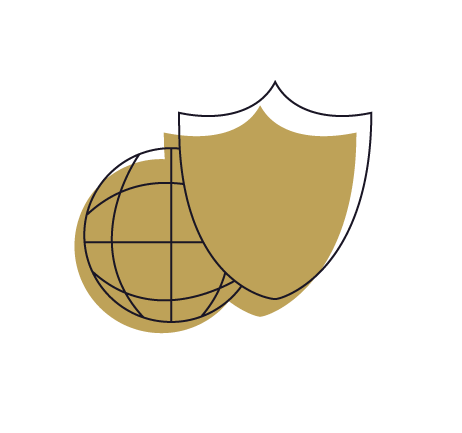
Priority Sustainable Counterterrorism
The Priority Sustainable Counterterrorism portfolio engages policymakers, practitioners, and academics from the local to the international level on sustainable solutions to security issues that lead to increased terrorism and violent extremism. Initiative efforts offer solutions to the systemic inequalities, unintentional oversights, capacity restraints, and differences in social or political approach that foster the distrust and grievances bad actors exacerbate. This initiative is multiregional and multidisciplinary – a partner in bridging the gaps between policy and practice.
Priority Sustainable Counterterrorism hinges on prevention, is largely nonkinetic, and is implemented through a combination of bottom-up and top-down approaches across sectors, actors, and levels. Targeted adjustments to processes and policies can drastically improve the coordination and implementation necessary for peace and development programming to affect positive and lasting change.
Priority policies are those that can be enacted in the short-term to mitigate complex and expansive issues; these short-term solutions support and are a part of long-term progress. Recommendations are evidence-based and connect issues with sustainable solutions by following a unique model of analysis.
The Priority Sustainable Counterterrorism portfolio is directed by Tammy Palacios.
Priority Sustainable - Localization
Localization programming and strategies must be informed by and implemented with local actors proximate to and most relevant to the development, capacity building, peacebuilding, prevention, or P/CVE goals they address. This project engages with smaller and remote located civil society organizations (CSOs) working on youth, women, social capacity building, peacebuilding, P/CVE, civic engagement, and justice. Intentionally partnering with these CSOs can be done today and supports sustainable solutions to insecurity, including violent extremism and terrorism.
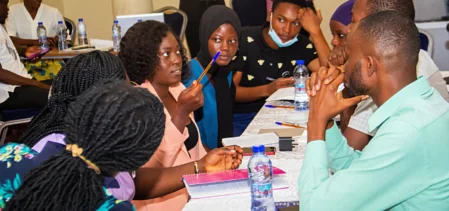
Supporting CSOs to Mitigate the Spread of Terrorism in the Sahel Executive Summary
Strengthening partnerships with NGOs and CSOs, especially those that support youth, women, peacebuilding, and social capacity building, will strengthen communities against susceptibility to engagement in violence.
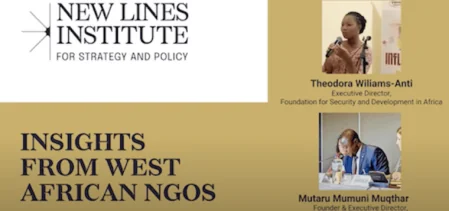
Listen to Local Actors: Insights from West African NGOs ahead of Africa Summit
Leaders from Foundation for Security and Development in Africa, West Africa Center for Counter Extremism, Youth Advocates Ghana, Friends of the Nation, and Center for Democratic Development-Ghana discuss the role of civil society, youth, women, and local communities in furthering sustainable peace and security across West Africa.
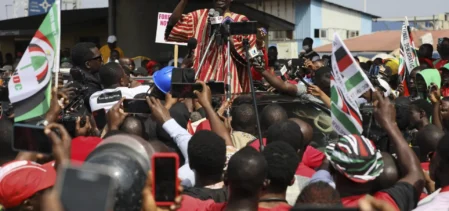
The Process of Democratic Development in Ghana
In this podcast episode, host Tammy Palacios sits down with Paul N.K. Aborampah Mensah, senior program manager for Ghana’s Center for Democratic Development.
Through their talk, they hone in on the situation and challenges ahead of Ghana’s 2024 elections, including the Vigilantism Law, approaches to civic education, and how civil society groups can improve their effectiveness.
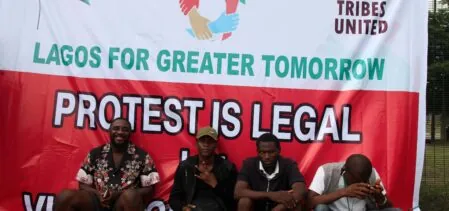
Nigerian Civil Society Working Group
Over 20 Nigerian civil society organizations working on topics such as justice, youth, women, capacity building, and peacebuilding engage in this short-term working group, where they discuss the role of civil society in furthering peace and security. The group discusses how civil society and local and national governments can best work together to strengthen and support communities across Nigeria, including conflict– affected areas in the country’s north, so they may be less susceptible to violence.
Sustainable Counterterrorism - Integrating Security and Development
To be effective, development and security programs and strategies must be further integrated and coordinated in conflict-affected areas. Effective and sustainable counterterrorism policies will be comprehensive and balanced – coordinating all entities and actors working on a terrorism threat from its nascent beginnings in a community through to its kinetic stages and clashes with other terrorist actors and international and national security forces.
This project uses the Priority Sustainable Counterterrorism model to produce terrorism analysis and recommendations that both can be implemented in the short term and support long-term strategies. These are informed by landscape assessments, local insights, and analysis on the kinetic and non-kinetic operations of al Qaeda- and ISIS-affiliated terrorist groups.
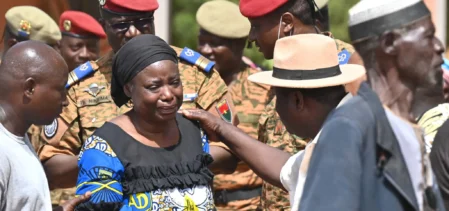
Preventing Another al Qaeda-Affiliated Quasi-State: Countering JNIM’s Strategic Civilian Engagement in the Sahel
This report presents unique terrorism analysis on JNIM’s civilian engagement strategy. The al Qaeda affiliate in the Sahel’s civilian engagement strategy connects the tactical, operational, and strategic levels, proving that coordinated and comprehensive counterterrorism is not just beneficial but necessary to countering this group.
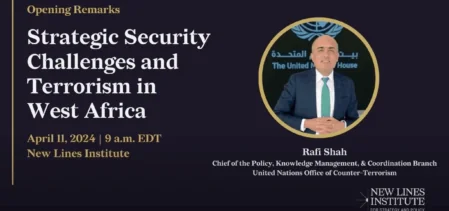
Strategic Security Challenges and Terrorism in West Africa
At this event, the United Nations Office of Counter-Terrorism; Embassy of Togo; West African think tanks Centre de Recherche Politique d’Abidjan and Timbuktu Center for Strategic Studies on the Sahel; and practitioner experts engaged in a rich discussion on security challenges and possible solutions in West Africa. Policymakers and experts discussed how to apply lessons learned to better mitigate the spread of terrorism by supporting strong communities and sustainable structures necessary for a peaceful and prosperous West Africa.
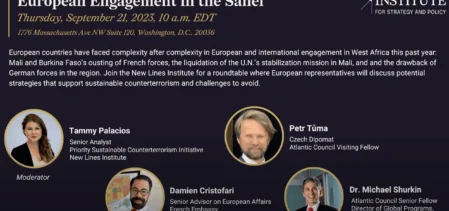
European Engagement in the Sahel
At this roundtable, European representatives including Chief of Policy at the French Embassy Damien Cristofari, Atlantic Council Africa & Europe policy expert Dr. Michael Shurkin, and Czech diplomat Petr Tuma discussed insecurity, sustainable counterterrorism, and potential challenges in West Africa.
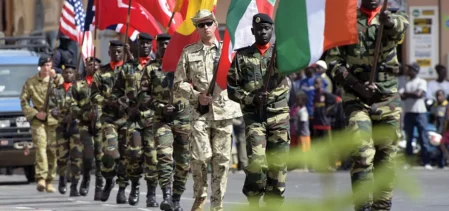
Integrating U.S. Military Assistance with Conflict Prevention and Stabilization in the Sahel
Integrating U.S. security and development policy is a necessary step toward addressing the extremist threat, security issues, and great-power competition. U.S. counterterrorism assistance should include efforts that leverage local governance and intra-state relations.
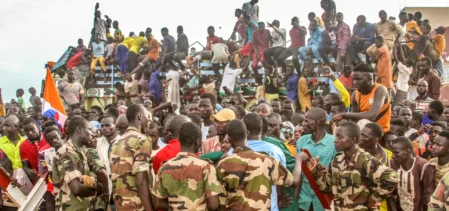
All Eyes on Niger
This podcast episode dives into potential ramifications of the most recent coup in Niger on Sahelian counterterrorism initiatives and regional stability.
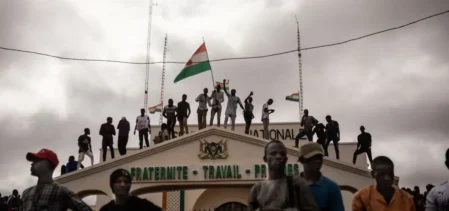
Niger: A Longtime Bastion of Stability in West Africa Could Drive Destabilization
Al Qaeda and ISIS affiliates could metastasize into Niger following the coup, significantly affecting the chances of long-term democratic stability in the area. Structural change that supports good governance in West Africa must be the center to a comprehensive, African-led approach. Good governance and fair interactions with security forces are the only way to quell terrorist recruitment of aggrieved citizens in West Africa.
Positive Prevention
Prevention programming may target youth and children in the hopes of deterring their radicalization and engagement with a terrorist group. When implemented in a positive frame and in an age-appropriate and information-specific way, human agency can be leveraged, and youth can be better supported so they may make a greater contribution to a peaceful and prosperous society. Positive Prevention may mitigate backlash, anti-government sentiment and grievances, and prevent future engagement with terrorist and violent ideologies and/or actors by placing a security frame on children and youth that is not positive or does not capture positive potential.

Positive Prevention: Kenyan Youth and Civil Society Working Group
Over 20 Kenyan youth and civil society organizations working on justice, youth, women, capacity building, and peacebuilding convene in this working group to outline youth and civil society’s role and contribution to a peaceful and prosperous Kenya. Through addressing root causes and strengthening and connecting systems and institutions, these local actors outline what positive prevention should look like: working with all facets of a community and all stakeholders to best strengthen individuals and communities from susceptibility to violence.

U.S. State-level Prevention Working Group
The U.S. State-level Prevention project hopes to build on existing domestic prevention and community resiliency efforts. This project will engage on prevention implementation: how prevention is being done and how it can be implemented in states across the U.S. to prevent future targeted violence and terrorism attacks. This project is strictly non-partisan and leverages a positive tone to feature sustainable solutions guided by community and municipal actors.
In the news
- Who Are The Former Jihadists Now Holding Syria’s Aleppo?
-
Fighting Extremism in Nigeria by Strengthening Civil Society, Modern War Institute at West Point
-
JNIM Training Camp in Burkina Faso Shows Terror Group’s Deadly Ambition, Africa Defense Forum
-
Can Nigeria’s New Government Address Its Growing Security Challenges?,The National interest
Submissions
The New Lines Institute for Strategy and Policy publishes work that combines geopolitical insight with subject-matter expertise. New Lines Institute publications examine tactical developments involving regimes, nonstate actors, local politics, ideologies, etc. Our work situates them in the strategic context of macro-level factors such as geography, populations, economics, military power, history, and culture. All our content must demonstrate analytical empathy and is geared toward advancing the cause of human security and stabilization and development on our planet. That said, we do not publish “op-ed” pieces, polemical content, or activist/advocacy work.
We welcome contributions from diverse experts with various sub-specialties to ensure that we consistently produce the highest-quality product. Our team firmly believes that expertise exists across the political spectrum and disciplinary fields; the key is to help our authors showcase it without indulging in partisan discussions. We expect our authors to focus on the how, why and (most importantly) the what next because our audience is already very familiar with the who, what, where, and when of the subjects we tackle.


